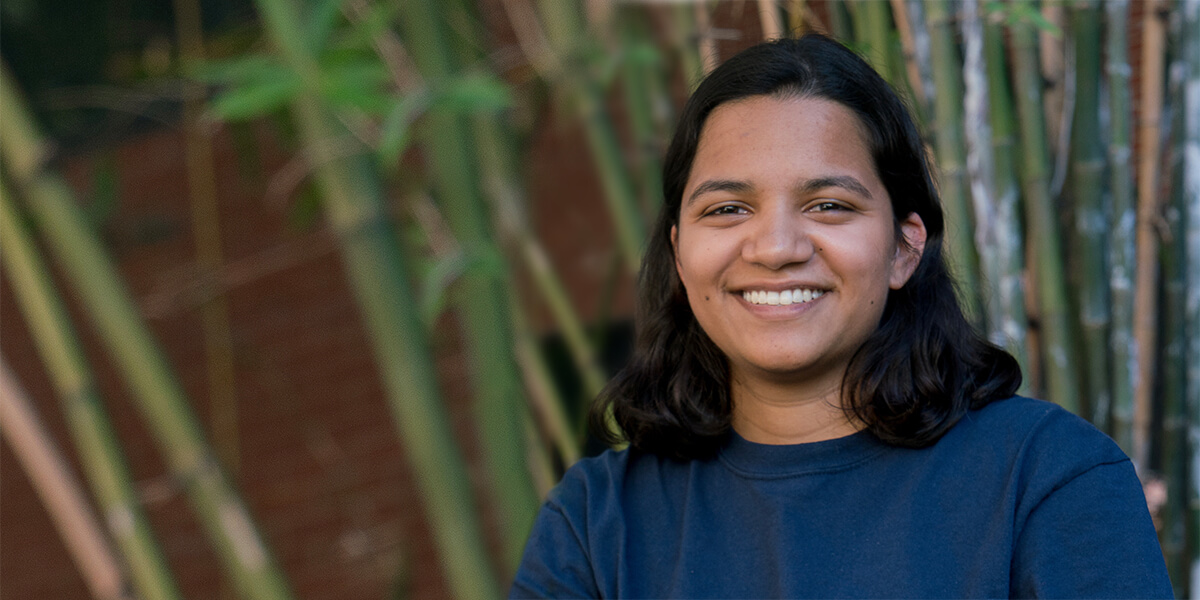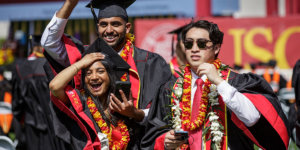
The award recognizes Leena’s impressive commitment to research and her significant contributions to multiple research projects. (Image Courtesy of Leena Mathur)
Leena Mathur, a USC senior completing a triple major in computer science, cognitive science, and linguistics, recently received the Computing Research Association’s (CRA) 2022 Outstanding Undergraduate Researcher Award. The award recognizes top undergraduate students from colleges across North America who demonstrate excellence and outstanding potential in an area of computing research. Mathur is one of four recipients who received this prestigious award in 2022.
Mathur’s research interests center on computational foundations of artificial intelligence (AI), as well as advancing AI to benefit society.
“I find it motivating to work on AI research that has the potential to enhance human health and well-being,” Mathur said. “I feel honored to receive this award, alongside other inspiring undergraduate researchers.”
The CRA Outstanding Undergraduate Researcher Award is sponsored by Microsoft Research and Mitsubishi Electric Research Labs (MERL). As part of this award, each recipient will receive financial assistance of up to $1,500 to attend a research conference of their choice. Mathur plans to use this funding to attend a machine learning conference later this year.
At USC, Mathur has worked on multiple, interdisciplinary human-centered AI research projects. She’s conducted research in USC’s Interaction Lab on robot perception of empathy and socially assistive robots that aid children with autism; developed algorithms for preserving endangered languages in USC’s Linguistics Department; and, for her senior thesis advised by USC Viterbi Professor Maja Matarić, Mathur created computational approaches to advance machine perception of human behaviors and emotions.
“Leena is a tremendously deserving recipient of this award,” said Matarić, the Chan Soon-Shiong Chair and Distinguished Professor of Computer Science, Neuroscience, and Pediatrics. “Her extensive undergraduate research experience has purposefully focused on projects that have the potential for real impact in the world. Numerous students do numerous research projects, but very few have such clarity of purpose aimed at the greater good.”
In the future, Mathur plans to pursue a Ph.D. towards an academic research career focused on advancing artificial intelligence to benefit society.
Mathur’s undergraduate research has been published in seven papers, six with her as the lead author or co-lead author. One of them was nominated for the Best Paper Award at the 2020 ACM International Conference on Multimodal Interaction. Mathur is a USC Presidential Scholar and a recipient of the USC Provost’s Undergraduate Research Fellowship. She has also received two national research awards: the Barry M. Goldwater Scholarship and the Astronaut Scholarship.
In addition to her research at USC, Mathur also conducted computer vision research at the Ecole Polytechnique Fédérale de Lausanne in Switzerland during the summer of 2019. This past summer, she conducted research at the California Institute of Technology on computer vision and speech processing approaches for machine perception of human emotion.
Mathur, who grew up in Northern California, first developed an interest in AI during her time on a robotics team in high school.
“I was attracted to USC for its strong engineering program and its Engineering + X philosophy that encourages students to pursue interdisciplinary interests,” Mathur said. “When I entered USC as a computer science major with an interest in AI, I soon realized that cognitive science was a natural ‘X’ to complement my study of computer science with an enhanced understanding of cognition and behavior.”
She added: “After taking a few linguistics classes, I determined that I would also major in linguistics for a deeper academic grounding in the human ability to acquire, interpret, and produce language,”
At USC, Mathur is a member of CAIS++, the student branch of USC’s Center for AI in Society (CAIS). CAIS++ undergraduates work in teams on project collaborations with faculty and industry clients to tackle pressing societal problems in a range of domains. She served as the president of the organization for the 2020-2021 year.
She has also worked as a resident assistant for two years in USC’s freshman residential colleges and as an undergraduate teaching assistant in USC Viterbi’s Department of Computer Science.
Outreach and mentorship are important to Mathur. She’s served as a mentor for freshmen in USC’s Women in Engineering (WIE) mentorship program, designed and led AI workshops for WIE and USC’s Women in Computing club, and led outreach events for Los Angeles students through USC Viterbi’s K-12 STEM Center. In 2019, she taught an eight-week programming class for third-graders at a Los Angeles public school through USC’s JEP Program.
Mathur credits USC Viterbi’s supportive and inspiring environment, as well as the university’s wide range of resources and programs, for helping her reach her potential. She is especially grateful for the research track of USC’s W.V.T. Rusch Engineering Honors Program and for the National Academy of Engineering Grand Challenge Scholars Program.
“USC Viterbi encourages and challenges students to pursue a holistic engineering education and consider their societal impact,” Mathur said. “My research pursuits have benefited from the school’s emphasis on interdisciplinary studies and Engineering+X philosophy, as well as the exceptional faculty support of undergraduate research.”
Published on March 17th, 2022
Last updated on May 3rd, 2022









